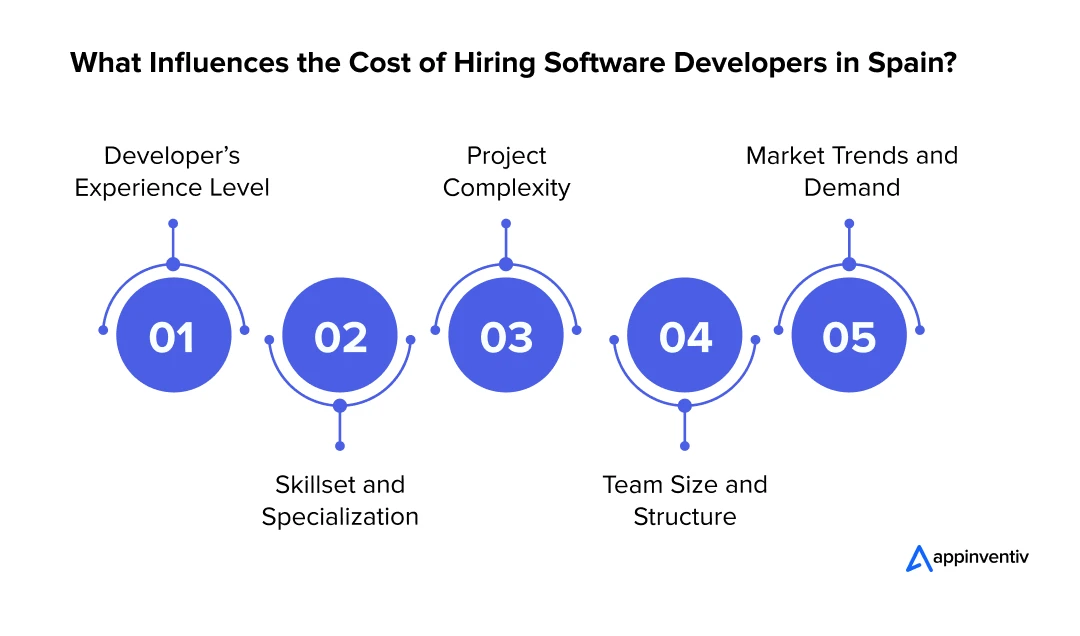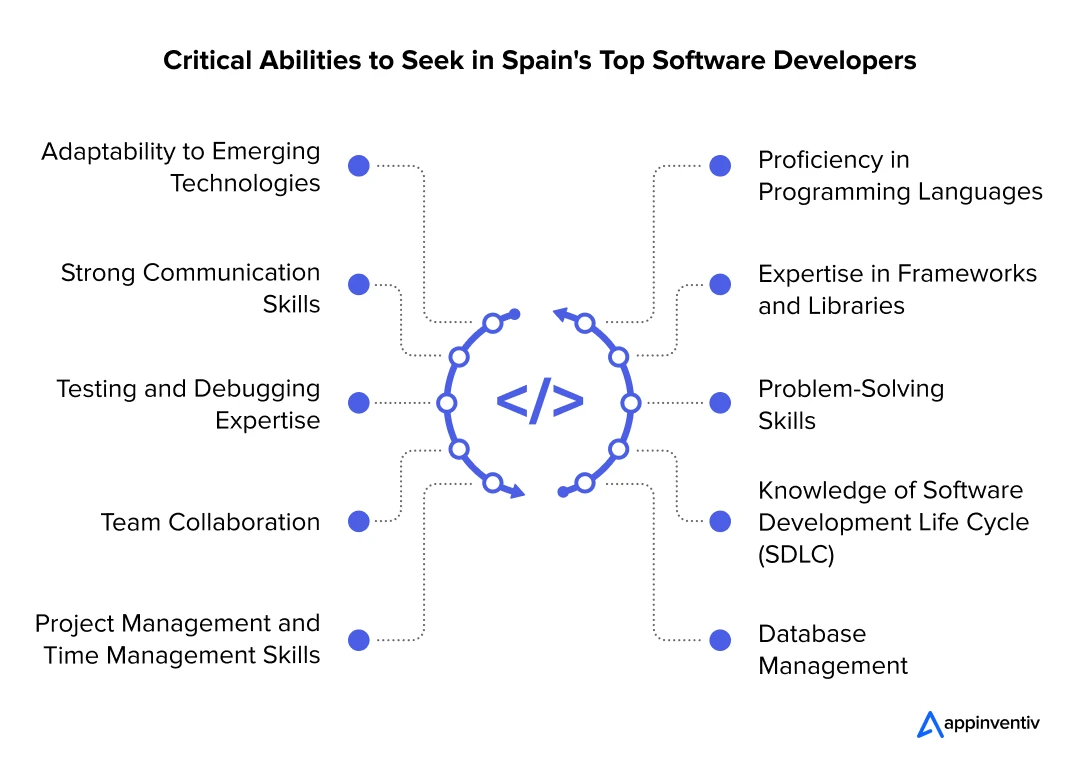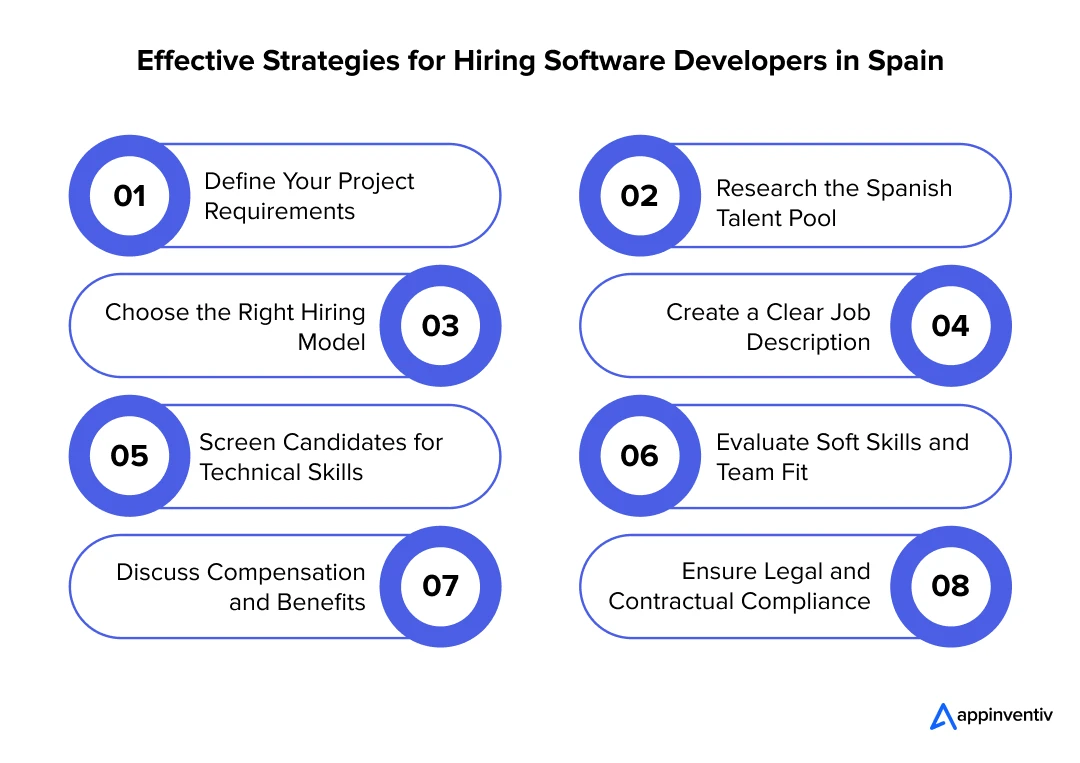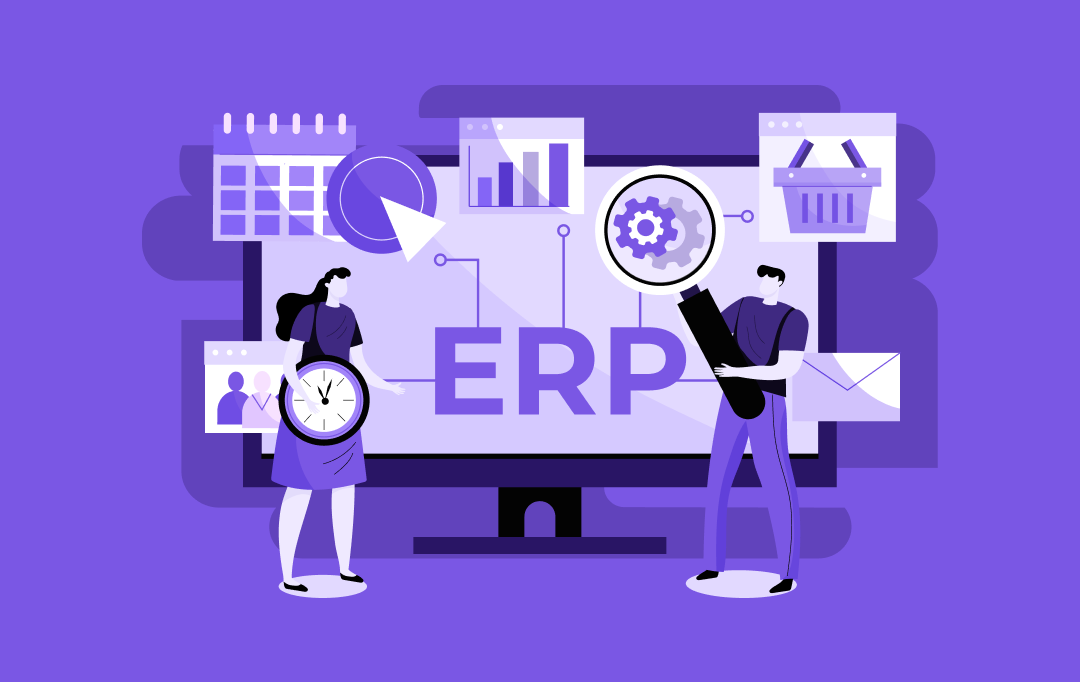- Selecting the Right Hiring Model for Your Requirements
- In-house, Outsourcing, and Freelancers
- Outstaffing vs. Full Outsourcing vs. Dedicated Development Teams
- How Much Does It Cost To Hire Software Developers in Spain?
- Factors Shaping the Cost of Hiring Software Developers in Spain
- 1. Developer’s Experience Level
- 2. Skillset and Specialization
- 3. Project Complexity
- 4. Team Size and Structure
- 5. Market Trends and Demand
- Must-have Skills to Look for in Top Software Developers in Spain
- Proficiency in Programming Languages
- Expertise in Frameworks and Libraries
- Problem-Solving Skills
- Knowledge of Software Development Life Cycle (SDLC)
- Database Management
- Adaptability to Emerging Technologies
- Strong Communication Skills
- Testing and Debugging Expertise
- Team Collaboration
- Project Management and Time Management Skills
- Best Practices of Hiring Software Developers in Spain
- Define Your Project Requirements
- Research the Spanish Talent Pool
- Choose the Right Hiring Model
- Create a Clear Job Description
- Screen Candidates for Technical Skills
- Evaluate Soft Skills and Team Fit
- Discuss Compensation and Benefits
- Ensure Legal and Contractual Compliance
- How to Overcome Software Developer Hiring Challenges in Spain
- Achieve Software Development Excellence with Top Developers
- FAQs
Have you ever wondered how software development is making waves across industries in Spain? From streamlining processes in healthcare to enhancing customer engagement in retail, businesses are seeing huge transformations through custom software solutions. These innovations improve efficiency and unlock new opportunities for growth and customer satisfaction.
Data Speake:
- According to IndustryARC: The Spanish Software Development Market is forecasted to reach USD 16.31 billion by 2030 after growing at a CAGR of 9.8% from 2023 to 2030.
- According to the Digital Economy and Society Index 2021: Spain ranks third in the EU in connectivity and seventh in digital public services, with levels well above the European average.
- According to IBISWorld: There are 16,873 businesses in the Software Development industry in Spain, which has grown at a CAGR of 6.2 % between 2019 and 2024.
Software development offers some pretty incredible benefits. It automates manual tasks, provides valuable data insights, and helps businesses stay competitive by integrating the latest technologies. Whether improving internal operations or creating standout customer experiences, the right software can take your business to the next level.
Bringing these ideas to life in Spain doesn’t come without its planning and financial commitment. The cost of hiring a software developer typically ranges between €28,800 to €48,000 or $30,000 – $300,000 (per project), depending on the complexity of your project and the expertise required.
So, let’s take a closer look at what it costs to hire a software developer and ensure your project is set up for success.
Turn your tech vision into reality with the best talent! Get a personalized cost estimate in seconds.
Selecting the Right Hiring Model for Your Requirements
Choosing the right hiring model for your software development needs can significantly impact your project’s success. Below, we explore various hiring models, their characteristics, and their pros and cons to help you make an informed decision.
A. Inhouse, Outsourcing, Freelancers
B. Outstaffing vs. Full Outsourcing vs. Dedicated Development Teams
In-house, Outsourcing, and Freelancers
In-house Development
In-house development involves hiring a team of developers as full-time employees within your organization. This team is dedicated exclusively to your projects and under your direct supervision.
Pros:
- Full control over the development process.
- Seamless communication with the team.
- Better alignment with company culture and objectives.
Cons:
- High recruitment and operational costs.
- Limited access to diverse expertise.
- Longer onboarding and setup times.
Outsourcing
Outsourcing entails hiring an external company to handle your software development needs. The outsourcing team takes responsibility for the project from start to finish.
Pros:
- Access to a global talent pool.
- Cost-effective, especially for short-term projects.
- Focus on core business while the vendor handles development.
Cons:
- Communication challenges due to time zone differences or cultural gaps.
- Less direct control over the project.
- Possible quality concerns if the vendor lacks expertise.
Freelancers
Freelancers are independent contractors hired for specific tasks or projects. They are usually employed for smaller, well-defined tasks.
Pros:
- Cost-effective for small-scale projects.
- Flexible hiring with no long-term commitments.
- Quick turnaround for well-defined tasks.
Cons:
- Limited accountability and availability.
- Coordination issues if multiple freelancers are involved.
- Quality can vary significantly based on individual skill levels.
Outstaffing vs. Full Outsourcing vs. Dedicated Development Teams
Outstaffing
In outstaffing, you hire developers in Spain from an external vendor who work as an extension of your team. They remain on the vendor’s payroll but report directly to you.
Pros:
- Full control over the team without administrative responsibilities.
- Flexibility to scale the team up or down.
- Access to skilled outsourced software developers in Spain without recruitment efforts.
Cons:
- Requires strong internal project management.
- Dependency on the vendor for team continuity.
- Communication challenges if developers are remote.
Full Outsourcing
Full outsourcing involves entrusting the entire software development lifecycle to an external company. This model is ideal for businesses lacking in-house technical expertise.
Pros:
- Complete end-to-end management by the vendor.
- Cost and time savings for long-term projects.
- Access to specialized expertise and advanced tools.
Cons:
- Limited direct involvement in day-to-day processes.
- Potential delays due to misaligned expectations.
- Vendor dependency for maintenance and updates.
Dedicated Development Teams
A dedicated team is a group of developers assigned exclusively to your project by a vendor. They function as a cohesive unit, focused solely on your requirements.
Pros:
- Tailored team for your specific needs.
- Transparent communication and flexibility.
- The long-term partnership ensures consistency and scalability.
Cons:
- Slightly higher costs compared to other models.
- Requires clear project scope and consistent collaboration.
- Dependency on the vendor for team availability.
How Much Does It Cost To Hire Software Developers in Spain?
Hiring software developers is a challenging process that requires careful consideration of several vital factors (details later). Before we delve into the cost-determining elements, let’s first understand the cost of hiring software developers across the different hiring models.
Cost variations for hiring software developers in Spain across hiring models
| Dedicated Development Team | A dedicated development team often charges between €23 to €65 or $25 to $70 per hour |
| Outsourcing | The hourly rates of this hiring model typically range between €28 and €75 or $30 and $80, depending on the region and expertise. |
| Freelancers | Freelancers usually charge between €23 and €47 or $25 and $50 per hour, making it the most affordable option but with varying reliability. |
| In-House Hiring | The hourly rate for in-house hybrid app developers ranges from €47 to €94 or $50 to $100. |
Now that we know the cost of hiring software developers across different hiring models let’s dig deeper into the key factors influencing costs:
Factors Shaping the Cost of Hiring Software Developers in Spain
Let’s explore the key factors determining the cost to hire software developers in Spain, from the level of expertise required to the complexity of your project.
Whether you’re looking for a front-end specialist or a full-stack developer, each factor plays a crucial role in shaping the final cost. Understanding these elements can help you make more informed decisions when hiring the right talent.

1. Developer’s Experience Level
The level of experience significantly impacts the cost of software development in Spain. For instance, junior developers with 1–3 years of experience might charge less but are prone to make mistakes and need guidance. Mid-level developers with 3–5 years of experience offer a good mix of affordability and expertise but often lack the expertise to handle advanced projects. Senior developers, having over 5 years of experience, command premium rates, but they can efficiently handle complex projects with a mark of excellence.
The table below highlights an estimated hourly rate of software developers in Spain as per their expertise and experience level:
| Expertise Level | Years of Experience | Hourly Rates |
|---|---|---|
| Junior Software Developer | 0-3 years | $30 – $70/hr / $30 – $70/hr €28 – €64/hr |
| Mid-level Software Developer | 3-5 years | $60 – $130/hr / €55 – €120/hr |
| Senior Software Developers | 5+ years | $90 – $200+/hr / €83 – €184/hr |
2. Skillset and Specialization
The developer’s area of expertise affects their hourly rates for software development. For instance, software developers who specialize in core areas like Artificial Intelligence, blockchain, IoT, cybersecurity, etc., charge higher than general software developers with limited skills. Additionally, familiarity with specific tools, programming languages, or platforms can increase the cost to hire software developers in Spain.
Here is a table outlining the cost of software developers based on their specific skill set:
| Specialization | Hourly Rates (USD) | Hourly Rates (EUR) |
|---|---|---|
| General Software Development | $30 – $70/hr | €28 – €64/hr |
| AI & Machine Learning | $80 – $150/hr | €74 – €138/hr |
| Blockchain Development | $90 – $180/hr | €83 – €165/hr |
| Cybersecurity | $70 – $140/hr | €64 – €129/hr |
| IoT & Embedded Systems | $60 – $130/hr | €55 – €120/hr |
| AR/VR Development | $75 – $160/hr | €69 – €147/hr |
| Cloud Computing & DevOps | $60 – $140/hr | €55 – €129/hr |
3. Project Complexity
The more complex your project, the higher the cost to hire developers. For instance, projects involving intricate algorithms, integrations, or advanced features like machine learning models, blockchain integration, or real-time processing require seasoned professionals who charge premium amounts. Conversely, simple projects with minimal functionalities can be completed on a comparatively low budget.
Here is a table outlining the timeline and cost of software development in Spain based on the project’s complexity level.
| Complexity Level | Average Timeline | Approximate Cost |
|---|---|---|
| Basic Software | 4-6 months | $30 – $70/hour/ €28 – €64/hr |
| Advanced Software | 4-9 months | $50 – $130/hour/ €55 – €120/hr |
| Highly Complex and Scalable Software | 9 months to 1 year or more | $75 – $160/hour/ €69 – €147/hr |
4. Team Size and Structure
The cost of hiring software developers increases with the size of the team required. For instance, a full-stack developer who can handle both front-end and back-end tasks may be more cost-effective. However, larger projects often require a team of specialists, including UI/UX designers, project managers, and DevOps engineers, leading to higher hiring costs.
Here is a table offering a clear breakdown of how skillset and team structure impact hiring costs:
| Team Composition | Hourly Rates (USD) | Hourly Rates (EUR) |
|---|---|---|
| Solo Full-Stack Developer | $40 – $90/hr | €37 – €83/hr |
| Small Team (Frontend + Backend) | $50 – $120/hr | €46 – €110/hr |
| Medium Team (+ UI/UX & QA) | $70 – $150/hr | €64 – €138/hr |
| Large Team (+ PM & DevOps) | $90 – $200/hr | €83 – €184/hr |
5. Market Trends and Demand
The software developer recruitment costs in Spain fluctuate based on industry trends and demands. Developer rates can rise during periods of high demand, such as after a tech boom or for specific skills shortages. Conversely, hiring costs might be more competitive during periods of economic downturn.
Must-have Skills to Look for in Top Software Developers in Spain
Some skills are essential when hiring top software developers in Spain. These include strong technical abilities, problem-solving skills, and the ability to collaborate effectively. Let’s explore these key skills to help you make the best hiring decision.

Proficiency in Programming Languages
A strong command of programming languages like Python, Java, JavaScript, C++, or Ruby is essential for software development. Developers should be able to write clean, efficient, and maintainable code that adheres to best practices.
Their ability to work with multiple languages demonstrates versatility and adaptability to different project needs. This skill also helps in reducing software developer hiring costs in Spain.
Expertise in Frameworks and Libraries
Top developers are well-versed in frameworks and libraries such as React, Angular, Django, and Spring Boot, which streamline the development process. These tools provide ready-made components and structures, reducing development time while ensuring scalability and efficiency. Their familiarity with these frameworks often determines the speed and quality of project delivery.
Problem-Solving Skills
Exceptional problem-solving skills are a hallmark of great developers. They must be able to analyze complex challenges, think critically, and implement innovative solutions. This ability ensures smooth project execution, particularly when tackling unexpected issues or optimizing application performance.
Knowledge of Software Development Life Cycle (SDLC)
A solid understanding of the SDLC, including stages like planning, designing, testing, and deployment, is crucial for delivering high-quality software. Developers who grasp these processes can manage workflows effectively and ensure timely project completion. Their ability to adhere to structured methodologies also helps maintain consistency and minimize software developer hiring costs in Spain.
Database Management
Proficiency in managing databases like MySQL, MongoDB, etc., is vital for developers. They should know how to design, query, and optimize databases for efficient data handling. A developer’s ability to work with relational and non-relational databases ensures that applications handle data seamlessly.
Adaptability to Emerging Technologies
The tech landscape is ever-evolving, and developers must stay updated with AI, blockchain, IoT, and cloud computing trends. Their ability to learn and apply new technologies ensures your software remains innovative and competitive. Developers who embrace emerging tech can integrate cutting-edge features into your projects.
Strong Communication Skills
Communication is a critical skill for developers, enabling them to understand client requirements and collaborate with team members. Developers must clearly articulate technical concepts to non-technical stakeholders and provide regular updates. This ensures transparency and alignment throughout the development process.
Testing and Debugging Expertise
Developers should excel in testing and debugging to ensure the reliability of applications. Familiarity with tools like JUnit, Selenium, or Postman helps them identify and fix bugs efficiently. Their commitment to quality assurance results in stable, user-friendly software.
Team Collaboration
Software development is rarely a solo endeavor, so developers must be team players. Their ability to collaborate with designers, testers, and project managers ensures that all aspects of the project align. Strong teamwork fosters better communication and leads to cohesive project execution.
Project Management and Time Management Skills
Developers with project management skills can prioritize tasks and meet deadlines without compromising quality. Familiarity with tools like JIRA, Asana, or Trello enhances their workflow management ability. Their organizational skills contribute to smooth project delivery and minimize software developer hiring costs in Spain.
- Tech Company of the Year 2023, awarded by Times Business
- Fastest Growing Technology Company 2023 – 2024, awarded by Deloitte
- India’s Growth Champions in IT 2023, awarded by the Economic Times

Best Practices of Hiring Software Developers in Spain
Navigating the process of hiring software developers in Spain can be a game-changer for your business. From understanding the local talent pool to identifying the right skills and navigating legal frameworks, this guide will help you make informed decisions. Let’s dive into the steps and best practices to ensure you find the perfect fit for your development needs.

Define Your Project Requirements
Start by understanding the scope of your project and identifying the specific skills needed. Define the programming languages, tools, and technologies in which you expect the developer to be proficient. This will help you target the right talent and set clear expectations for both parties throughout the hiring process.
Research the Spanish Talent Pool
Spain has a growing tech scene, especially in Madrid, Barcelona, and Valencia. Take time to explore the local tech ecosystem and understand the talent landscape. Check out tech meetups, online platforms, and regional recruitment agencies to understand the developers available and their areas of expertise.
Choose the Right Hiring Model
Depending on your needs, you can choose a full-time employee to hire developers in Spain, a freelance developer, or work with an agency. A full-time employee might be ideal for long-term projects, while a freelance developer or agency could be more suitable for short-term or highly specialized tasks. Understand the benefits and drawbacks of each model before making a decision.
Create a Clear Job Description
A well-written job description is key to attracting the right candidates. Clearly state the responsibilities, required technical skills, and desired experience. Highlight the type of projects they’ll work on and your company culture and values to ensure the candidate is a good fit for your team.
Screen Candidates for Technical Skills
Assess technical competence through coding challenges, problem-solving exercises, and portfolio reviews. Use platforms like GitHub to check their past projects and contributions. This will give you insight into their coding quality, ability to solve complex problems, and proficiency in the tools relevant to your project.
Evaluate Soft Skills and Team Fit
While technical expertise is crucial, soft skills like communication, adaptability, and collaboration are equally important. Ensure candidates can articulate their ideas and work effectively in a team setting. A developer who can fit into your company’s culture will be more productive and less likely to face integration issues.
Discuss Compensation and Benefits
Research the average salary for custom software developers in Spain, considering location, skill level, and experience. Offer a competitive salary and attractive benefits package to attract top talent. Additionally, be transparent about performance bonuses, growth opportunities, and work-life balance policies to make your offer more enticing.
Ensure Legal and Contractual Compliance
Spain has specific labor laws that govern employment contracts, taxes, and workers’ rights. Before hiring, ensure you know these laws and include necessary clauses in the agreement, such as intellectual property rights, confidentiality, and termination conditions. This will protect you and the developer and avoid future legal disputes, ultimately helping minimize software development costs in Spain.
How to Overcome Software Developer Hiring Challenges in Spain
Hiring custom software developers in Spain can come with its own challenges, but these hurdles can be easily overcome with the right strategies. Here are some tips to tackle these common obstacles:
1. Challenge: Talent Shortage in the Local Market
The demand for skilled developers in Spain often exceeds the available supply, particularly in cities like Madrid and Barcelona. This makes it harder to find the right talent within a short period, leading to delays in project timelines.
Solution: Consider broadening your search to other Spanish regions or hiring remote developers from other countries. This approach helps you tap into a larger talent pool and fill vacancies faster.
2. Challenge: Intense Competition for Skilled Developers
Spain’s tech industry is competitive, making it difficult to stand out to top developers. Many companies are vying for the same talent, increasing the risk of losing out on high-quality candidates.
Solution: To overcome this, offer a competitive salary, benefits package, and unique perks. Emphasize your company’s culture, growth opportunities, and work-life balance to make your offer more attractive.
3. Challenge: Language Barriers in Communication
While many developers in Spain speak English, language proficiency can vary, particularly in regions outside of major cities. Miscommunication or misunderstandings can create challenges in remote work environments or collaborative projects.
Solution: Ensure clear language expectations in job postings and assess candidates’ language skills during the interview process. Consider offering language training to help bridge any communication gaps, especially for international developers.
4. Challenge: Unclear Expectations During the Hiring Process
If job expectations, responsibilities, or project scope aren’t communicated properly, it can lead to confusion or mismatched hires. Candidates may be unsure about what they’re applying for or the type of work expected from them.
Solution: Provide clear, detailed job descriptions that outline responsibilities, skills required, and desired outcomes. Also, ensure transparency about the hiring process and timelines, so candidates know exactly what to expect.
5. Challenge: Legal and Contractual Compliance
Spain has strict labor laws that can make the hiring process more complex, especially for international companies unfamiliar with local regulations. Failing to comply can result in legal disputes or delays.
Solution: Work with legal professionals familiar with Spanish labor laws to ensure all employment contracts are compliant. Make sure to include necessary clauses on intellectual property, confidentiality, and other legal aspects to avoid future complications.
Achieve Software Development Excellence with Top Developers
Choosing the right software development company in Spain is essential for delivering high-quality, cost-effective software solutions. At Appinventiv, we combine expertise, innovation, and efficiency, making us the ideal partner for software development in Spain.
Here’s why collaborating with us helps you manage software development costs in Spain:
- Optimized Development Process: Our structured approach ensures that your software is developed efficiently, meets quality standards and aligns with your business goals.
- Experienced Team of 1600+ Experts: Our highly skilled and diverse team brings a wealth of knowledge, delivering reliable and top-tier development for each project.
- Advanced Technology Integration: We leverage cutting-edge tools and frameworks to create scalable, secure, innovative software solutions.
- Trend-Focused Solutions: Our development strategy ensures your software stays aligned with current market trends, keeping it relevant and competitive.
- Proven Track Record: With a portfolio of successful projects for renowned brands such as KFC, IKEA, Pizza Hut, Domino’s, Adidas, and more, we consistently deliver results. We’ve also helped startups like JobGet, EdFundo, and Vyrb grow and secure funding.
Partner with Appinventiv to gain access to unmatched expertise and innovation in software development in Spain.
FAQs
Q. How much does it cost to hire a software developer in Spain?
A. The cost to hire software developers in Spain typically ranges from $30,000 to $300,000 per project, depending on the developer’s experience, expertise, and the project requirements. For freelance or short-term contracts, hourly rates can vary between $100 and $150 based on skills and project complexity.
Q. How long does it take to hire a software developer in Spain?
A. The hiring process for a software developer in Spain generally takes 3 months to 12 months or more, influenced by the role’s complexity, recruitment methods (in-house or through an agency), and the availability of qualified candidates.
Q. What are the benefits of hiring a software developer in Spain?
A. Here are some prominent advantages of hiring software developers in Spain:
- Access to High-Quality Talent: Spain has a growing pool of tech professionals, especially in cities like Barcelona and Madrid.
- Cost-Effectiveness: Competitive costs compared to developers in other European countries or North America, with salaries ranging between $30,000 and $300,000.
- English Proficiency: Many developers in Spain are fluent in English, making communication seamless for global projects.
- Time Zone Alignment: Spain’s time zone is ideal for collaborating with European and North American teams.
- Cultural Fit: Spanish developers are known for their collaborative and innovative working styles.


- In just 2 mins you will get a response
- Your idea is 100% protected by our Non Disclosure Agreement.

Custom Development or White Label Solutions: Which is Right for Your Business?
Key takeaways: 77% of companies are prioritizing digital transformation; the right tech approach is crucial for staying competitive. Custom development offers tailored solutions for unique needs, flexibility, and long-term scalability. Whereas, white-label solutions provide quick market entry, cost-efficiency, and easy customization for standard needs. Appinventiv’s expertise helps you navigate custom development vs white-label to choose…

ERP Integration in Australia - Why It Is Essential and How to Do It Right
Key takeaways: ERP integration enables operational efficiency, reduced costs, and enhanced decision-making. Healthcare, finance, manufacturing, retail, and all the other sectors are benefiting from ERP integrations in Australia. While ERP integration can be costly, ranging from AUD 45,000 - AUD 450,000, it leads to significant long-term savings and scalability. Compliance with Australian regulations is critical,…

Predictive Analytics Software Development - Features, Benefits, Use Cases, Process, and Cost
Key Takeaways Predictive analytics helps businesses shift from “what has happened” to "what will happen," enabling proactive strategies rather than reactive ones. Real-time analytics and AI integration are driving the growth of predictive analytics, making it more accurate, accessible, and critical for business success. Custom predictive analytics solutions can enhance customer satisfaction, reduce costs, and…
















